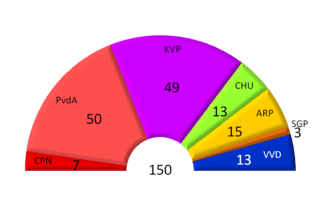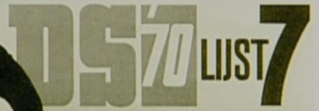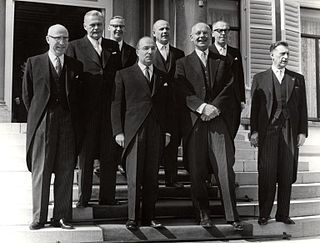
The Christian Democratic Appeal is a Christian-democratic political party in the Netherlands. The CDA was originally formed in 1977 from a confederation of the Catholic People's Party, the Anti-Revolutionary Party and the Christian Historical Union, and has participated in all but three governments since then. Sybrand van Haersma Buma has been the Leader of the Christian Democratic Appeal since 18 May 2012.

The Anti-Revolutionary Party was a Protestant Christian democratic political party in the Netherlands. The party was founded in 1879 by Abraham Kuyper, a neo-Calvinist theologian and minister. In 1980 the party merged with the Catholic People's Party (KVP) and the Christian Historical Union (CHU) to form the Christian Democratic Appeal (CDA).

General elections were held in the Netherlands on 22 January 2003.

General elections were held in the Netherlands on 13 June 1956. For the first time, the Labour Party (PvdA) emerged as the largest party, winning 50 of the 150 seats in the House of Representatives.

General elections were held in the Netherlands on 15 May 1963. The Catholic People's Party (KVP) remained the largest party, winning 50 of the 150 seats in the House of Representatives.

Early general elections were held in the Netherlands on 29 November 1972. The Labour Party (PvdA) remained the largest party, winning 43 of the 150 seats in the House of Representatives.

General elections were held in the Netherlands on 25 May 1977. The Labour Party remained the largest party, winning 53 of the 150 seats in the House of Representatives. Following the election, it took 208 days of negotiations to form a new government. This was a European record for longest government formation that stood until after the 2010 Belgian general election. The Christian Democratic Appeal was formed by the Anti-Revolutionary Party (ARP), Christian Historical Union (CHU) and the Catholic People's Party (KVP) in 1976. The first joint party leader was a member of the KVP, Dries van Agt.

General elections were held in the Netherlands on 26 May 1981. The Christian Democratic Appeal (CDA) emerged as the largest party, winning 48 of the 150 seats in the House of Representatives.

The Political Party of Radicals was a progressive Christian and green political party in the Netherlands. The PPR played a relatively small role in Dutch politics and merged with other left-wing parties to form GreenLeft in 1991.

General elections were held in Sweden on 15 September 1968. Held in the wake of the crushing of the Prague spring, it resulted in a landslide victory for the Social Democratic government and Prime Minister Tage Erlander. It is one of two general elections in Swedish history where a single party received more than half of the vote. Erlander would resign the following year after an uninterrupted tenure of 23 years as head of government.

The Second Biesheuvel cabinet was the cabinet of the Netherlands from 9 August 1972 until 11 May 1973. The cabinet was formed by the political parties Catholic People's Party (KVP), People's Party for Freedom and Democracy (VVD), Anti-Revolutionary Party (ARP) and the Christian Historical Union (CHU) after the resignation of the First Biesheuvel cabinet. The centre-right rump cabinet served as a caretaker government until the election of 1972.

The First Biesheuvel cabinet was the cabinet of the Netherlands from 6 July 1971 until 9 August 1972. The cabinet was formed by the political parties Catholic People's Party (KVP), People's Party for Freedom and Democracy (VVD), Anti-Revolutionary Party (ARP), Christian Historical Union (CHU) and the Democratic Socialists '70 (DS'70) after the election of 1971. The centre cabinet was a majority government in the House of Representatives. It was the first of two cabinets of Barend Biesheuvel, the Leader of the Anti-Revolutionary Party as Prime Minister, with Roelof Nelissen of the Catholic People's Party and Molly Geertsema the Deputy Leader of the People's Party for Freedom and Democracy serving as Deputy Prime Ministers.

The De Jong cabinet was the cabinet of the Netherlands from 5 April 1967 until 6 July 1971. The cabinet was formed by the political parties Catholic People's Party (KVP), People's Party for Freedom and Democracy (VVD), Anti-Revolutionary Party (ARP) and the Christian Historical Union (CHU) after the election of 1967. The centre-right cabinet was a majority government in the House of Representatives. Piet de Jong of the Catholic People's Party was Prime Minister, with Johan Witteveen of the People's Party for Freedom and Democracy and Joop Bakker of the Anti-Revolutionary Party serving as Deputy Prime Ministers.

The Zijlstra cabinet was the cabinet of the Netherlands from 22 November 1966 until 5 April 1967. The cabinet was formed by the political parties Catholic People's Party (KVP) and the Anti-Revolutionary Party (ARP) following the fall of the Cals cabinet on 14 October 1966. The centre-right rump cabinet served as a caretaker government until the election of 1967. Jelle Zijlstra (ARP) was Prime Minister, Jan de Quay (KVP) and Barend Biesheuvel (ARP) served as Deputy Prime Ministers.

The Democratic Socialists '70 was a social democratic political party in the Netherlands.

The Cals cabinet was the cabinet of the Netherlands from 14 April 1965 until 22 November 1966. The cabinet was formed by the political parties Catholic People's Party (KVP), Labour Party (PvdA) and the Anti-Revolutionary Party (ARP) after the resignation of the Marijnen cabinet on 27 February 1965. The centre-left cabinet was a majority cabinet in the House of Representatives. Jo Cals of the Catholic People's Party was Prime Minister, with Anne Vondeling the Leader of the Labour Party and Barend Biesheuvel the Leader of the Anti-Revolutionary Party serving as Deputy Prime Ministers.

A rump cabinet is a cabinet from which one or more coalition partners have withdrawn and which has minority support in parliament.
























